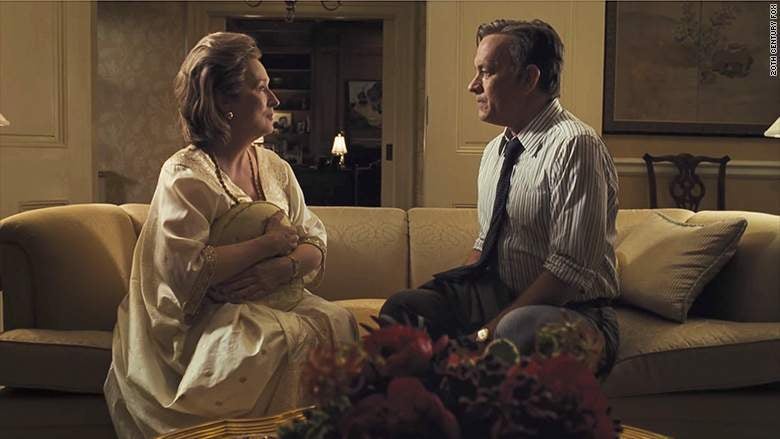
Stephen Spielberg’s foray into 1970s US political scandal, headed by two great actors, is a timely triumph, writes Emelia Hamilton-Russell
There is a scene near the beginning of The Post that speaks volumes: the garrulous Washington Post editor, Ben Bradlee — played by a tanned, craggy-faced Tom Hanks — is in a gentleman’s club restaurant. He is mid breakfast-meeting with his paper’s publisher, Katharine Graham, played by Meryl Streep, and snapping at her in his gravelly Bostonian drawl: ‘Don’t put your finger in my eye, Kay.’ He then carelessly puffs cigar smoke into her face. Arrogant, ambitious and bitter about his under-performing publication, Bradlee’s brash persona is later undercut by his joy in, and commitment to, great journalism. ‘My God, the fun,’ he declares at one point. And it is. But it’s also deeply serious.
And it remains serious today. The script for The Post arrived in director Stephen Spielberg’s letterbox last February, shortly after Trump’s inauguration. The 31-year-old Liz Hannah’s first screenplay chronicles The Washington Post’s publication of the Pentagon Papers, a top-secret report that revealed that the US had been losing the Vietnam War for years, and covering it up to save face.
As a result much of the film resembles a Seventies political thriller, a stylish prequel to All the Presidents Men. But there’s a second important plotline: The Washington Post is in trouble and Graham, America’s first female publisher, is advised to take the company public. Swamped by men, the beginning shows her clutching her pearls and clearing her throat in board meetings, only to be talked over, about and down to by the broad-shouldered suits (think Theresa May at the Tory party conference). As the political scandal unfurls — with the journalists racing to break the story — so the commercial future of the ailing Post is on the line.
Nixon, as you expect, is a big presence in the film, and Spielberg handles him skilfully: the shots of the 37th president are always of his back, and the camera is voyeuristic as he gesticulates wildly on the phone from the Oval office. Spielberg uses the real tapes from the Oval office – a nice touch.
The topicality of a film, depicting the fraught relationship between the government and the press, together with the mighty combination of Streep and Hanks, is uncanny, and it’s no surprise that Spielberg felt pressure to get this script into cinemas. It’s a film that needed to be made now.
And perhaps that’s why they decided to give it a docudrama feel: the long, hand-held shots of the newsroom are urgent and agile and the second half of the film takes place within the narrow window of about 24 hours. The only scenes not shot in Washington is the opening sequence of war reporter Daniel Ellsberg, played by Mathew Rhys, witnessing young Americans being zipped into body-bags in the Vietnam jungle.
While the film deals in weighty issues, it resists the temptation to build to a grand, Oscar-winning, soliloquy. It’s in the moments of private moral wavering, the back and forth of a series of small conversations, where history is made. At base, it’s a story about professionals doing their jobs. Intelligently underplayed, the denouement comes at the moment when the buck stops with Graham. Should The Post publish or not? She calls it, and she calls it right. And then she goes to bed. Three hours later, the copy is written, and the printing presses roll.
There’s no doubt that The Post is a worthy addition to Spielberg’s roster, and will gather Oscars accordingly. But if, like me, you care about the truth, and if you rejoice in seeing governments being held to account by the might of the free press, then The Post might well be the best film you see this year.
Emelia Hamilton-Russell is a Researcher for Spear’s








